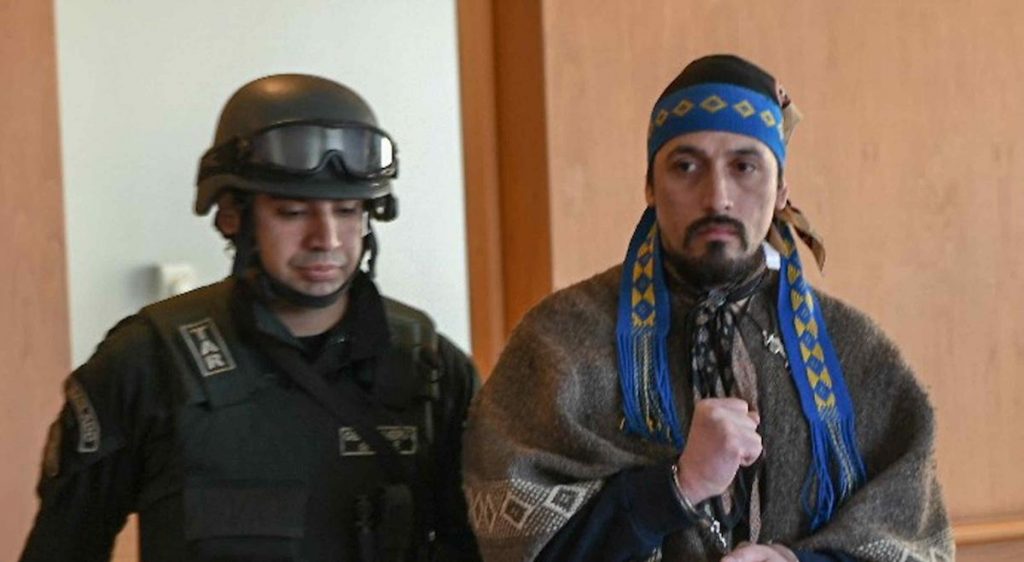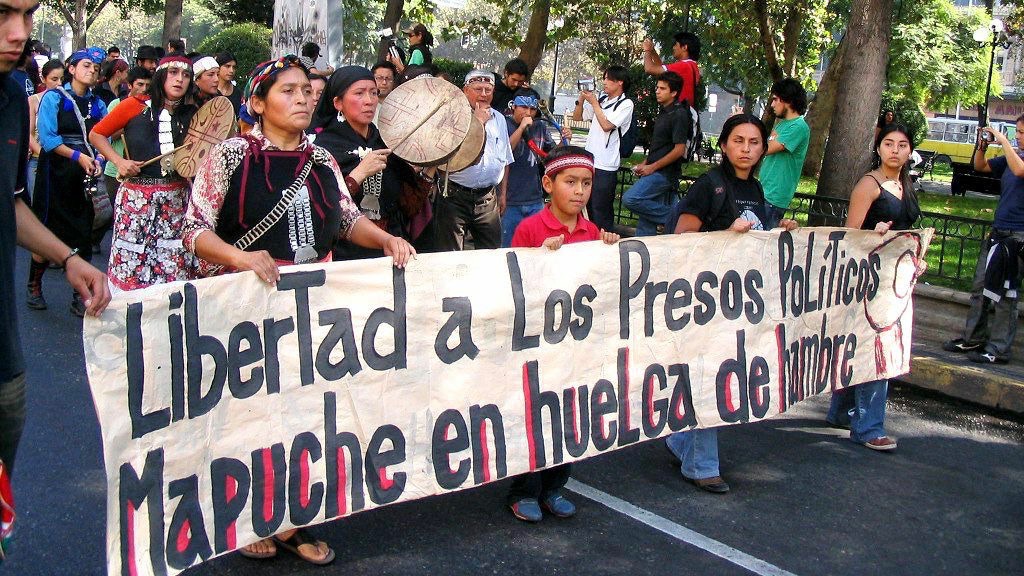This is the fourth article of the series Criminalization and punishment in quarantine, a communications initiative of different international media projects whose objective is to raise awareness to, amid the current public health crisis, the realities of those people that are subjected to forced isolation (penitentiary, psychiatric, or migrant detention). The oblivion and exclusion of these populations only increases in these times with the suspension of visits. What is the situation in different countries and what are the responses of the Governments? During these days of quarantine can the confinement of societies be a bridge of solidarity towards the people deprived of their freedom? This series of reports seeks to understand the situation of prisons in times of pandemic.
This article focuses on Mapuche political prisoners. The Mapuche people live on both sides of the Andes mountains in Chile and Argentina. The Mapuche communities in this region have been engaged in processes of land recuperation to take back their ancestral territory from large property owners. The communities have been facing a campaign of threats, harassment, repression and violence from the State, large landowners and multinational companies that seek to occupy this economically profitable and strategically important territory. Often times, the Mapuche’s struggle to remain on their land is classified as terrorism. Many Mapuche leaders or Lonkos, as well as community members, have suffered this repression first hand and several are serving long sentences in prisons in Chile.
On September 11, 2018 Mapuche Lonko Facundo Jones Huala was extradited from Argentina to Chile. This was despite the Human Rights Commission of the United Nations asking for a stay on the extradition while independent experts reviewed the case. Thus, in complying with the Chilean request and extraditing Huala, Argentina was in violation of international law. The Chilean state has accused the Mapuche leader of starting a fire in an inhabited place, and of possession of an unconventional weapon. Huala was also a victim of legal persecution in 2015 when his community began a process of recovering land from the Italian millionaire group, Benneton.
The pandemic has reached a global level. From the Southern Patagonia there are also voices that demand protection and shelter behind the prison walls. Today, the Mapuche people, historically criminalized on both sides of the Andes mountains, ask for the protection of those who are deprived of their freedom for defending their ancestral territories-bodies. From the prisons of Temuco and Angol, with preventative prison and convictions, they ask for their right to life to be preserved amid the pandemic.
Temuco
Family members, friends and the Network of Support of Machi Celestino Córdova (Machi is a spiritual leader in Mapuche communities) denounced on April 25 the denial of the government to protect the life and physical integrity of the Mapuche prisoners with the rapid advance of COVID-19. In this context, the Chilean Gendarmerie let a state official enter the prison that was being tested for COVID-19 so he could meet with Facundo Jones Huala and other prisoners in the Temuco prison. Then two days later the Lonko (Mapuche leader) was separated from the rest of the Mapuche prisoners. Finally the test administered on Facundo Jones Huala came back negative and he remained in preventative isolation for 15 days.

The Committee for the Indigenous Prisoners, in Argentina, released a communique wherein they ask the Argentine state to initiate actions to repatriate Facundo Jones Huala who was extradited to Chile in September 2018. In the document they denounce the “criminal actions of the government of Sebastián Piñera” and call for international solidarity in light of the unjust situation of discrimination suffered by the Mapuche people. Lonko Facundo Jones Huala was extradited to Chile from Argentina and convicted with scarce evidence and on the basis of many assumptions, the creation of the enemy that later facilitates the appropriation of its land. The lands of the Patagonia on both sides of the border have immeasurable natural riches: water, gas, petroleum, among others. The obstacle to exploiting these resources are the Indigenous peoples.
Communities of several Mapuche land recovery areas joined in denouncing that the Chilean government does not even follow the recommendations of the international organizations like the UN and the Inter-American Commission on Human Rights (IACHR) to protect the life of incarcerated populations from the danger of the pandemic. Family members and networks of support manifested that “The IACHR reminds states that every person deprived of their liberty under their jurisdiction has the right to receive humane treatment, with complete respect to their dignity, their fundamental rights, and especially the life and personal integrity.”
Previously, in a communique from the Temuco prison, the Mapuche political prisoners had already denounced that as of now the only people who had been released were “people who committed crimes against humanity and anti-Mapuche crimes like the killer cop who killed (Camilo) Catrillanca and the terrible agents of Operation Hurricane,” justified with the excuse of the pandemic. “Does the life of the Mapuche people not matter?” they ask. They highlight that it is a political decision that keeps the Mapuche prisoners locked up, despite having met the necessary requirements to qualify for humanitarian release to avoid the danger of infection.
On May 4, Machi Celestino Córdova restarted his liquid hunger strike that he had suspended on March 20 to demand that Convention 169 of the ILO be fulfilled, specifically referring to the Indigenous prisoners, with the same demands of protection.
Angol
From this territory the Mapuche Communities in resistance of Malleko denounced the discrimination faced by Mapuche prisoners in the Angol prison and the abusive measures they are subjected to. On May 4, Mapuche prisoners in the Angol prison also began a liquid hunger strike to demand the respect of protection measures from the danger of COVID-19 in this context. They denounced that it is necessary to “free Mapuche political prisoners or agree on a measure different than imprisonment, as stipulated in the Convention 169 of the ILO, articles 8, 9, and 10, and considering also the Declaration of the United Nations on Rights of Indigenous People.” At the same time, they also demand land restitution and demilitarization of the territories that protect the economic interests of transnational companies.
In the communique they call on the diverse communities in resistance to be alert to the injustice of the Chilean government against the Mapuche political prisoners in the Angol prison: “The government must not be mistaken, the Mapuche political prisoners are not alone.”
Rights of the peoples
The situation of neglect of Indigenous people amid the pandemic also obliged the IACHR to make a pronouncement on May 8 where it calls on governments to adopt protection measures for Indigenous people with regards to the pandemic. The Commission adverts about the situation of “special vulnerability of Indigenous people, especially those in voluntary isolation and beginning contact.” It is important to remember the historic denial of rights of Indigenous people and how this is reflected in their current socio-economic conditions.
*Text by Vivian Palmbaum of Marcha Noticias
**Wallmapu is the Mapuche name for ancestral Mapuche land





